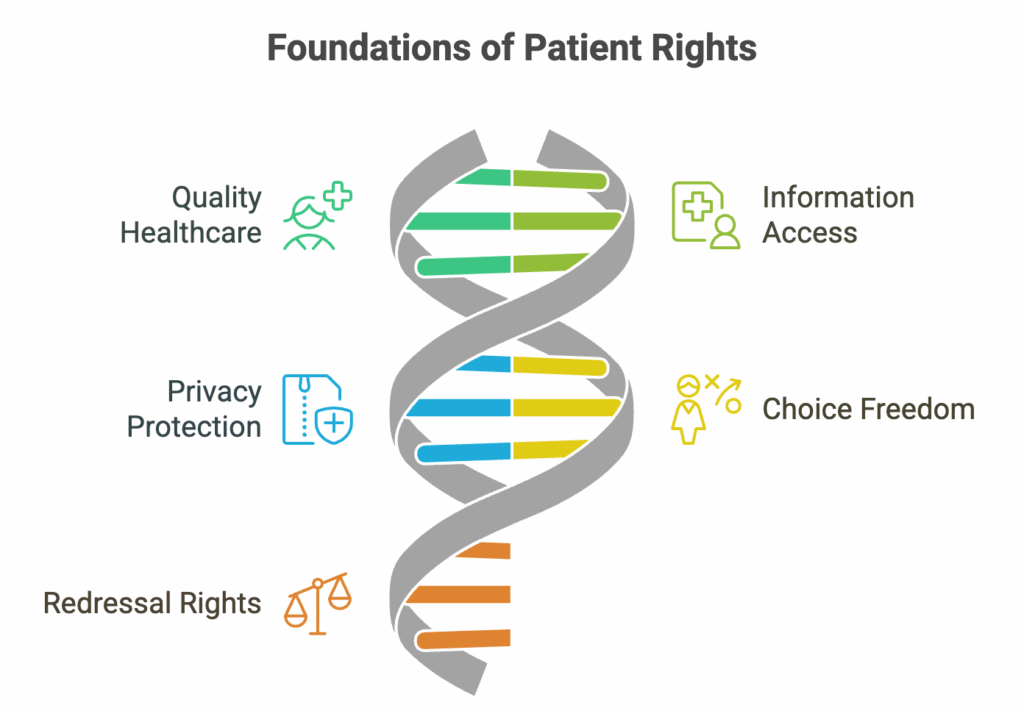Now Reading: A Practical Guide to Patient Rights & Justice: Unlocking Your Healthcare Rights
-
01
A Practical Guide to Patient Rights & Justice: Unlocking Your Healthcare Rights

A Practical Guide to Patient Rights & Justice: Unlocking Your Healthcare Rights
Healthcare can feel complicated. Knowing your rights as a patient is crucial for receiving the best possible care and ensuring fair treatment. This guide breaks down essential patient rights, offering practical advice and solutions to common issues.
Understanding Patient Rights: Your Foundation for Healthcare
Think of patient rights as the rules protecting you within the medical system. These rights are built on the principles of respect, dignity, and informed decision-making. They exist to ensure that your voice is heard and your well-being is prioritised throughout your healthcare journey. Understanding these rights isn’t just about knowing what you can do; it’s about feeling confident and secure when interacting with doctors, hospitals, and insurance providers.
Knowing Your Healthcare Rights: What You’re Entitled To
Several fundamental rights form the cornerstone of patient care. These include:

- The right to quality healthcare: Every individual deserves respectful, competent, and appropriate medical treatment regardless of background or financial status.
- The right to information: You have the right to receive clear and understandable information about your diagnosis, treatment options, and potential risks.
- The right to privacy: Your medical records and personal health information are protected by law and cannot be disclosed without your consent.
- The right to choose: You have the right to select your healthcare provider and treatment plan.
- The right to redressal: You have the right to seek compensation or resolution if your rights are violated or you experience medical negligence.
The Right To Access Healthcare: Ensuring Fair and Equal Treatment
Access to healthcare shouldn’t be a privilege; it’s a right. This means hospitals and clinics cannot deny you emergency treatment based on your ability to pay. While the specifics vary by country (for example, universal healthcare systems in countries like Canada and the UK contrast with the more market-based approach in the US), the core principle remains: everyone deserves basic medical attention.
Challenges: Marginalised communities often face significant barriers to access, including language barriers, geographical isolation, and systemic biases.
Example: In 2021, a study by the National Academies of Sciences, Engineering, and Medicine found significant racial and ethnic disparities in healthcare access and quality in the US.
Navigating Healthcare Decisions: Your Right to Informed Consent and Refusal
Informed consent is more than just signing a form. It means understanding the proposed treatment or procedure, its potential benefits and risks, and alternative options. You have the right to ask questions and receive clear, understandable answers. Crucially, you also have the right to refuse any treatment, even if medical professionals advise against it. Your refusal must be respected, provided you are mentally competent to make that decision.
Caregiver Role: Caregivers play a critical role in helping patients understand their options and advocate for their wishes, especially when patients are unable to do so themselves.
5. Practical Examples of Rights: Scenarios and Solutions for Patient Rights
Let’s consider some real-world scenarios:
- Scenario: A doctor recommends surgery without fully explaining the risks and alternative treatments.
- Your Right: Right to Information, Right to Choose.
- Solution: Ask the doctor to explain the procedure in detail, including potential complications and alternative treatments. Seek a second opinion from another doctor before making a decision.
- Scenario: A hospital refuses to provide treatment because you lack health insurance.
- Your Right: Right to Access Healthcare (Emergency Care).
- Solution: Remind the hospital of its legal obligation to provide emergency care. Contact patient advocacy organisations for assistance.
- Scenario: An insurance company denies a claim for a necessary medical procedure.
- Your Right: Right to Quality Healthcare.
- Solution: Review your insurance policy and file an appeal with the insurance company. Seek assistance from a patient advocacy group or legal aid society.
Protecting Your Medical Information: The Right to Privacy and Confidentiality
Your medical records are private. This means healthcare providers cannot share your information with anyone without your explicit consent, except in very specific circumstances (e.g., legal requirements). This right is essential for building trust with your doctor and feeling comfortable sharing sensitive information.
Documentation is Key: Keep a personal record of your medical history, treatments, and communications with healthcare providers. This can be invaluable if you need to file a complaint or legal claim.
Seeking Justice: What to Do When Your Patient Rights Are Violated
If you believe your patient rights have been violated, take action.
- Document everything: Keep detailed records of the incident, including dates, times, names of individuals involved, and specific details of what occurred.
- File a complaint: Start by filing a formal complaint with the healthcare provider or institution involved.
- Seek external assistance: Contact your local medical board, consumer protection agency, or a patient advocacy organisation.
- Consider legal action: If the violation is serious or you have suffered significant harm, consult with an attorney specialising in medical malpractice or patient rights.
Insurance & Rights: Understanding your insurance policy is vital. Know what your plan covers, what your deductibles and co-pays are, and how to appeal denied claims. Your insurance company also has a responsibility to uphold patient rights by providing access to necessary care.
By understanding and asserting your healthcare rights, you can take control of your medical journey and ensure you receive the quality, respectful, and equitable care you deserve.










